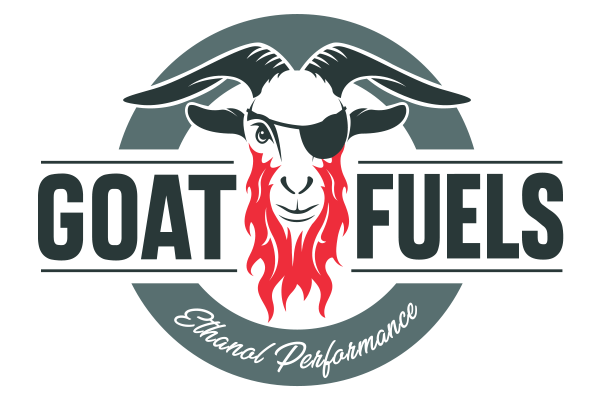Goat Fuels FAQ
Goat Fuels FAQ – Power, Performance & Precision
Got questions about Goat Fuels? You’re in the right place! Whether you’re wondering about the differences between E85R and E109R, how ethanol affects engine performance, or what makes our fuels the ultimate choice for racing, we’ve got the answers.Dive into our FAQ to learn more about how Goat Fuels delivers maximum power, cooler combustion, and a cleaner burn—all at a competitive price.
Fueling Your Performance – Everything You Need to Know
E85R contains 15% alkylate gasoline and meets the “E85” standard SS-EN 15293:2018. This provides slightly improved cold-start characteristics. E109R has a higher ethanol content, resulting in a higher octane rating and enhanced cooling properties. The increased ethanol percentage in E109R offers even better cooling and greater resistance to knocking compared to E85R.
Goat Fuels E85R has an octane rating of 106.6, while E109R has an octane rating of 108.7. Ethanol naturally has a high octane rating, meaning the fuel can withstand more pressure before self-igniting. This allows for higher compression, increased boost pressure, and more power output.
Yes, ethanol’s properties allow the engine to run cooler compared to conventional gasoline. This leads to lower intake temperatures and a cooler combustion chamber, which enables better airflow and efficiency.
For maximum performance, E109R is the best choice, as it has a higher octane rating and better cooling due to its increased ethanol content. If you have margin in your power output or are limited by a rulebook requiring E85, then E85R is a great option.
Yes, many users switching from gasoline to ethanol report increased power output and improved throttle response, especially in low and mid-range RPMs. In addition to increased peak power, Goat Fuels enhances drivability.
Ethanol is one of the few viable alternatives to reduce CO2 emissions and make internal combustion engines more sustainable. Goat Fuels actively works towards this and is at the forefront of development.
Alkylate gasoline is a cleaner and better version of regular gasoline but is still a petroleum-based product. It is produced from excess gases during oil refining and cracking, resulting in a fuel that burns cleaner, produces fewer harmful emissions, and remains stable over time.
Ethanol has about 30% lower energy content than gasoline, which requires a larger amount of fuel to be injected. However, Goat Fuels enables a higher efficiency by allowing increased boost pressure and compression, which partially compensates for the increased flow. When measured by weight rather than volume, the difference is minimal.
Goat Fuels is an ethanol-based fuel, so it is essential to ensure that fuel system components are compatible with ethanol. Ethanol can dissolve old gasoline residues, making it crucial to clean the system thoroughly before use. A fresh fuel filter is recommended, and it is advisable to monitor the fuel system closely during the initial usage phase.
For long-term storage, it is recommended to fill the system with alkylate gasoline to reduce the risk of corrosion and deposits. Many users simply fill the tank completely before winter storage and experience no issues. The main concern is ethanol’s hygroscopic nature, meaning it absorbs water from the air. It is the water, rather than the ethanol itself, that causes problems during extended storage. This issue is more significant in carbureted setups than in fuel-injected systems.
It is technically possible, but not practical. Goat Fuels is a race fuel and requires the engine management system to be calibrated for the correct fuel injection. In some cases, modifications to the fuel system may also be necessary to handle the increased fuel flow. Older cars may have rubber components in the fuel system that are not ethanol-resistant.
Goat Fuels contains purer ethanol than typical “fuel ethanol,” which conducts less electricity. This can cause some fuel sensors to inaccurately detect a lower ethanol content. Additionally, variations exist between different sensor models.
Yes, it is fine to mix Goat Fuels with both gasoline and E85 from gas stations.
As an engine reaches its thermal limit, heat load increases. The heated intake air reduces oxygen density, leading to poorer combustion. High exhaust temperatures can also increase backpressure in the exhaust system, negatively affecting engine power. Ethanol helps reduce thermal load and keeps the engine running cooler.
Yes! In a naturally aspirated engine, an increase of around 5% is typically seen just by switching fuels and adjusting fuel flow. Ethanol also allows for more aggressive ignition timing, further increasing power. High-compression engines with aggressive camshafts will see even greater gains.
Yes, a forced-induction engine will produce more power at the same boost pressure when switching to Goat Fuels. Ethanol’s cooling properties and high octane rating allow for increased boost pressure and more efficient combustion, resulting in higher power output.
Yes! Goat Fuels works excellently with nitrous. Either by increasing fuel flow in an existing system during nitrous activation or by using a separate fuel injection system.
Goat Fuels is sold in 25-liter cans, either individually or on pallets. We typically use half-pallets (holding 12 cans) or full EUR pallets (holding 24 cans). It is also possible to mix E85R and E109R on the same pallet.
Goat Fuels’ lubricant contains an advanced boron-based formula that reduces friction and protects the fuel system. By lowering cylinder friction, it reduces heat generation, minimizes wear, and increases overall efficiency. This results in higher power output and extended engine component lifespan. It is specifically developed to work optimally with our ethanol fuels.
For gasoline, the stoichiometric air-fuel ratio is 14.7:1, while for Goat Fuels E109R, it is 9.3:1. For E85, the stoichiometric ratio is around 9.9:1. This means that at lambda 1 (stoichiometric), ethanol-based fuels require a richer mixture than gasoline.
Ethanol fuel can be used in both 2-stroke and 4-stroke engines. It is also compatible with Wankel engines. There are no issues using it with aluminum engine blocks or Nikasil-coated cylinders.
Ethanol affects oil primarily through its water absorption properties. A high-quality oil is always recommended for race engines due to high stress levels. Most manufacturers offer specific oil formulations suited for ethanol use. A tighter piston-to-cylinder clearance can also extend oil lifespan.
Goat Fuels guarantees that its products can be used for at least one year after delivery. We have tested fuel that is five years old with no negative effects. It is recommended to store fuel in a dark place at a stable temperature. We have also tested storage in direct sunlight at 35°C, where the fuel remained stable despite expansion of the containers.
Contact & Order
We send what you need. E85R and E109R in stock.
Use the form or call us on +46 703 39 81 79 or send a email to info@goatfuels.com
PICK UP YOURSELF FROM OUR WAREHOUSE
Order no later than 11 and collect yourself the following day (free shipping). ATTENTION! Please wait for confirmation from us before collecting here:
Skoogs Åkeri & Logistik AB, Transportgatan 13, 262 71 ÄNGELHOLM, Sweden

